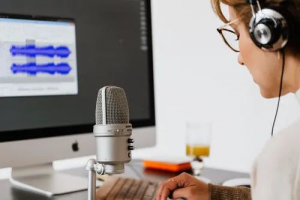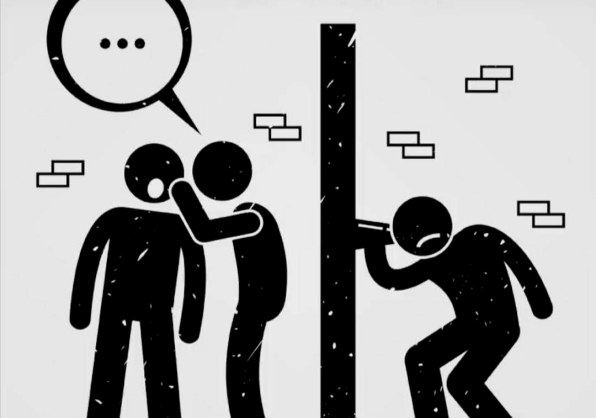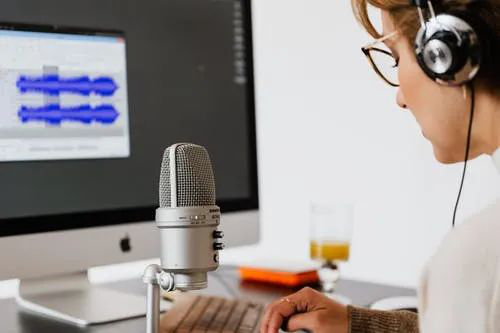
Why is my voice so unpleasant in WeChat Voice?
When you click on your WeChat voice, will you have such doubts: Is this my own voice? Why is it different from your usual voice? Why is it not as good as what I heard?
Why does this happen? Let’s find out together.
1.Production and propagation of sound
Sound is produced by the vibration of objects, and all objects that are making sound are vibrating. When you hear the whistling wind, it’s the air vibrating; When you play the guitar and pluck the strings, the strings vibrate; When you are talking or singing, your vocal cords are vibrating…
The propagation of sound requires a medium.
In daily life, people can communicate with each other in language, which shows that sound can be propagated in gas; The allusion that “partition walls have ears” shows that sound can propagate in solids; The fish in the water will swim away when someone speaks loudly on the shore, which shows that the sound can be propagated in the liquid; Although astronauts face each other in space, they need to use radio to speak and communicate, which shows that sound cannot be propagated in a vacuum.

2 Propagation medium: the “culprit” that causes bad voice
Sound can be propagated through the medium and thus be perceived by the auditory organs of humans or animals. Different propagation media will cause different sounds to be perceived.
I feel that my own voice in the recording is not as good as hearing my own voice directly, precisely because the propagation medium is different when the sound is propagated to the inner ear.
There are two ways for sound to enter the inner ear, both conduction and air conduction.
When you listen to yourself, your voice mainly depends on bone conduction.
Bone conduction, or “bone conduction” for short, refers to a series of processes in which sound is propagated to the inner ear through the skull, causing the inner ear lymph fluid to vibrate, and the spiral organ vibrates in response to the sound, and then the auditory nerve propagate the sound to the brain, thereby causing hearing.
In life, when we cover our ears with our hands and talk to ourselves, no matter how small the sound is, we can clearly hear what we are saying. This is the result of bone conduction.
The longer the wavelength of the sound, the so-called bass, the easier it is to pass through the tissues of the body to reach the ear, so we hear our own sound more magnetically and lower.
In addition, bone conduction can transmit sound to the inner ear more directly, with less volume loss, so the sound we hear is louder.
When I listen to my own recording, the sound is mainly conducted through the air.
Air conduction is the main way that we perceive sound, referred to as “air conduction”. The sound travels through the air and causes the tympani membrane to vibrate through the external auditory canal, and then is transmitted to the auditory nerve through the auditory ossicles and other tissues, and the auditory nerve transmits the signal to the brain. In this way, people hear the sound.
In the process of sound conduction through air, due to air resistance, the amplitude gradually decreases and the energy gradually attenuates. Therefore, the sound that enters the human ear through air conduction will appear thinner and have a lower volume.
Comparing the two conduction methods, bone conduction is more direct, while air conduction will change under the influence of air. Therefore, it is not difficult for us to understand why the sound in the recording “becomes” unpleasant.
3.Other factors that cause bad voice
Environmental factor
When the surrounding environment is too noisy, your voice will be disturbed by other noises, and the voice in your voice will become messy.
Equipment factor
Recording equipment will also have a certain impact on the sound quality.
If the quality of the recording equipment is poor, when the sound is converted into an analog signal by the equipment, the sound with too high or too low frequency will be filtered out by the filter, which will cause the sound to be distorted and cause great changes in the sound.

Psychological factors
In real life, we always prefer things that we are familiar with them. This phenomenon is called the “exposure effect” in psychology, also known as the “law of familiarity”.
Compared with the sound in the speech, we are more accustomed to the sound that we hear directly, so we naturally think that the sound we hear is better, and the sound in the speech is more strange.
In fact, the sound in the recording is closer to your real voice in reality, that is, your voice heard by other people. Both are conducted through the air.
In life, we can use the “exposure effect” to listen to our own voice in the voice and get used to it. You can also change your voice in your voice by learning some pronunciation skills.
Comments